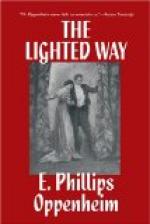“I have no objection to anything you may do outside this building,” Mr. Weatherley replied, “but as you are only a youngster, and you met the Count Sabatini at my house, I feel it only right to give you a word of warning. I may be wrong. One gets fancies sometimes, and there are some strange doings—not that they concern you, however,” he added, hurriedly; “only you are a young man with your way to make in the world, and every chance of making it, I should think; but it won’t do for you to get too many of Count Sabatini’s ideas into your head if you are going to do any good at a wholesome, honest business like this.”
“I quite understand, sir,” Arnold assented. “I don’t suppose that Count Sabatini will ask me to dine with him again. I think it was just kindness that made him think of it. In any case, I am not in a position to associate with these people regularly, at present, and that alone would preclude me from accepting invitations.”
“You’re young and strong,” Mr. Weatherley said thoughtfully. “You must fight your own battle. You start, somehow, differently than I did. You see,” he went on, with the air of one indulging in reminiscences, “my father was in this business and I was brought up to it. We lived only a stone’s throw away then, in Bermondsey, and I went to the City of London School. At fourteen I was in the office here, and a partner at twenty-one. I never went out of England till I was over forty. I had plenty of friends, but they were all of one class. They wouldn’t suit Mrs. Weatherley or the Count Sabatini. I have lost a good many of them.... You weren’t brought up to business, Chetwode?” he asked suddenly.
“I was not, sir,” Arnold admitted.
“What made you come into it?”
“Poverty, sir,” Arnold answered. “I had only a few shillings in the world when I walked in and asked Mr. Jarvis for a situation.”
Mr. Weatherley sighed.
“Your people are gentlefolk, I expect,” he said. “You have the look of it.”
Arnold did not reply. Mr. Weatherley shrugged his shoulders.
“Well,” he concluded, “you must look after yourself, only remember what I have said. By the bye, Chetwode, I am going to repose a certain amount of confidence in you.”
Arnold looked up from his desk.
“I think you may safely do so, sir,” he declared.
Mr. Weatherley slowly opened a drawer at his right hand and produced two letters. He carefully folded up the sheet upon which he had been writing, and also addressed that.
“I cannot enter into explanations with you about this matter, Chetwode,” he said, “but I require your promise that what I say to you now is not mentioned in the warehouse or to any one until the time comes which I am about to indicate. You are my confidential secretary and I have a right, I suppose, to demand your silence.”
“Certainly, sir,” Arnold assured him.
“There is just a possibility,” Mr. Weatherley declared, speaking thoughtfully and looking out of the window, “that I may be compelled to take a sudden and quite unexpected journey. If this be so, I should have to leave without a word to any one—to any one, you understand.”




